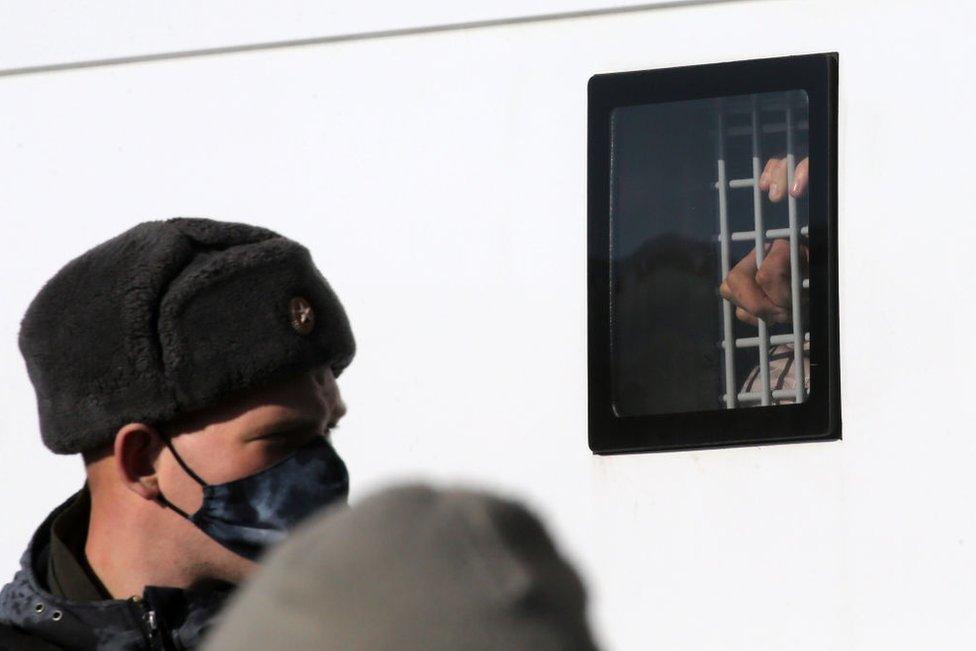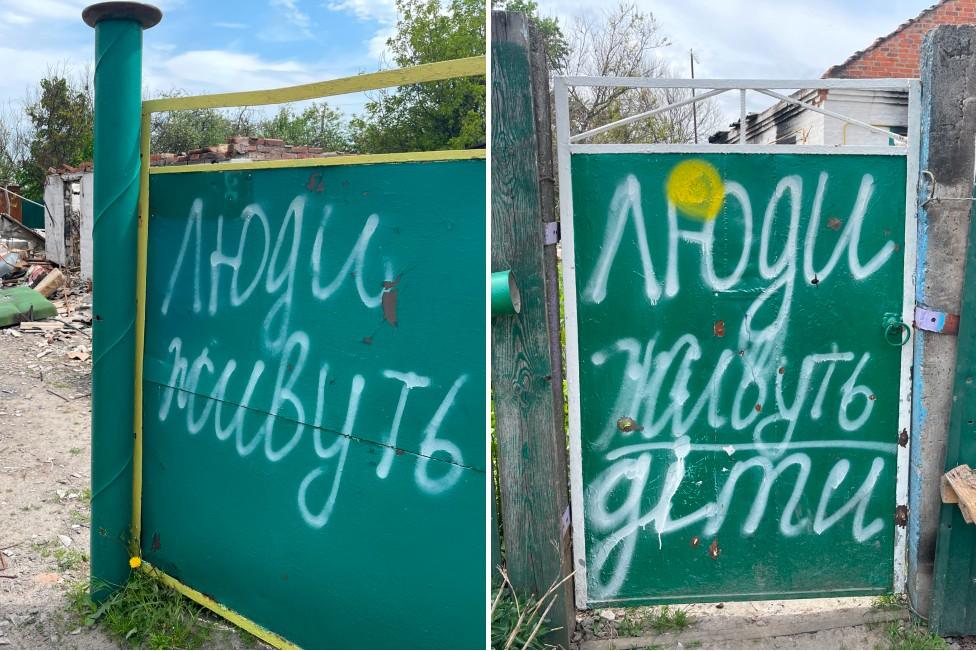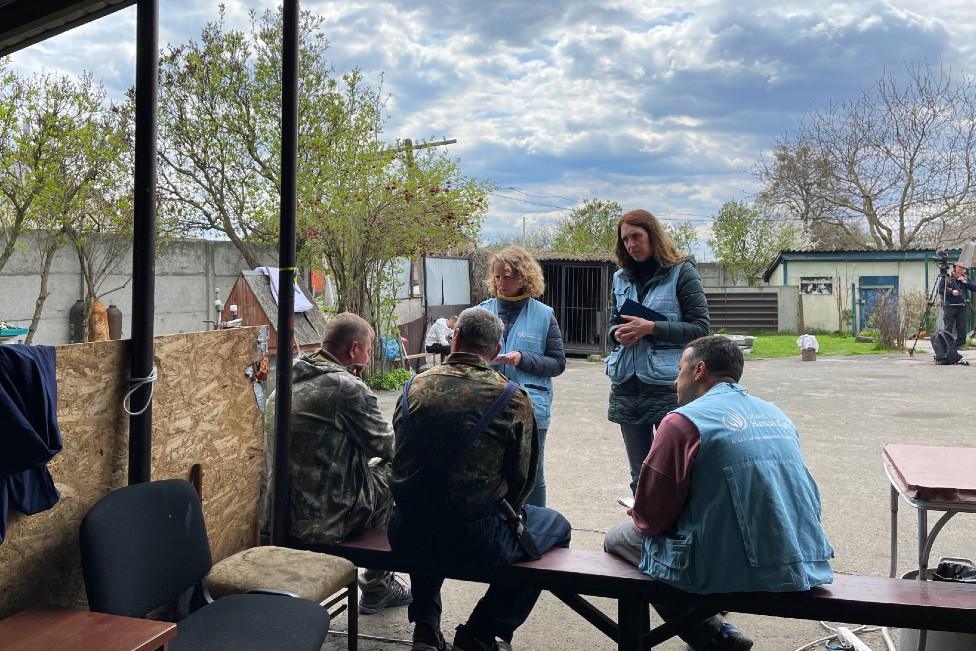Ukraine war: The defiant Russians speaking out about the war
- Published

To Ukrainians it was clear from the very start of Russia's invasion that this was no "special operation" to liberate the Donbas region, as Vladimir Putin had declared. It was all-out war.
But in Russia it's a crime to call it that.
Dozens of people have already been prosecuted under the "fake news" law, as it's known. They face up to 15 years behind bars for challenging the official line on Russia's invasion or criticising the military.
It's a dramatic increase in censorship in Russia, where Vladimir Putin has spent his two decades in power removing opponents, stifling free speech and silencing the independent media: a dismantling of democracy that is having devastating consequences here in Ukraine.
Vladimir Kara-Murza tried to warn of the danger.
The whole world now sees what the Putin regime is doing to Ukraine
In a speech in the US in March, external, the Russian opposition activist lambasted Western leaders for seeking constant "resets" in relations with Mr Putin, allowing their countries to act as havens for tainted money and looking the other way even as Russia became ever less free.
"The whole world now sees what the Putin regime is doing to Ukraine," Mr Kara-Murza told the Arizona House of Representatives, a fortnight into the war. "The bombing of maternity wards and hospitals and schools. The war crimes. These are war crimes."
But in Russia uttering such words is also a crime now.
A month after his speech, Mr Kara-Murza was picked up by police in Moscow and later charged with "spreading false information" about Russia's military. He's still in custody. The law he is accused of breaking was passed in March, soon after the invasion.
And yet Ukrainian prosecutors have already registered more than 11,000 alleged war crimes. A Russian soldier has admitted in court to shooting a civilian. And the BBC has gathered its own evidence, including CCTV footage of the shooting of two civilians by Russian forces.
Those returning to salvage what they can from the wreckage of Andriivka have more, powerful testimony.
When Russia invaded Ukraine, many families fled Kyiv for nearby villages like this, thinking they would be safer away from the capital. Instead they spent weeks cowering in cold cellars as occupying soldiers drove tanks into their yards and dug trenches in their vegetable plots.
After the Russians withdrew, in April, the village elder says the bodies of 13 residents were found here.
"They had their hands tied behind their backs and had been shot in the head," says Anatoliy Kibukevych. He then names every one of the victims.
The main road - the route taken by Russian tanks ordered to seize Kyiv - is lined with the rubble of homes: heaps of singed bricks with metal bedframes or pots and pans oddly marooned in the middle of them. Painted pleas that read "Children!" or "People!" on garden gates have been pierced by shrapnel.

Painted pleas in Andriivka: "People live here" (left) and "People live here - kids"
"Truth is the regime's main enemy," says Evgenia Kara-Murza, Vladimir's wife, from Washington DC, where she lives for safety reasons. "That's why I believe this regime is using this law to crush all dissent in Russia and to scare people into silence,"
"I'm sure Vladimir realised the risks were high. They have never been low for him," she says, with a reminder that her activist husband was poisoned twice in the past and nearly died.
But he kept returning to Russia and speaking out.
"He believes there comes a moment where you can't be afraid anymore and need to show to other people that they shouldn't be either."

When the war in Ukraine started, Lilia Yapparova felt compelled to cover it.
"I couldn't sleep, because people started to die… and I needed to be there," she told me in Kyiv, where for a while she was the only Russian reporter on the ground in Ukrainian-controlled areas.
There are only three even now - all women from independent media outlets. It's a tiny contingent compared with the Russian state TV correspondents who stride through eastern Ukraine in military clothing, "Z" patches on their arms in support of Russian soldiers, talking about "denazification" and the "liberation" of cities like Mariupol.
Ms Yapparova wanted to at least dent that solid wall of propaganda.
I can't hide facts, but am I going to jail for that?
"The only thing that matters for me right now is for the war to stop and for people from Russia to see what's really going on," she says.
But that's a battle of its own, on top of the danger of working on Ukraine's frontlines.
Meduza, the news site Ms Yapparova writes for, has been banned in Russia, like almost all independent outlets. Journalists and media have been labelled as "foreign agents" while Facebook and other social media are blocked.
Meanwhile, state TV channels have all switched to wall-to-wall coverage of Russia's "special operation".
"For now we lost the war with propaganda," Ms Yapparova concedes, describing how even people she knows personally are absorbing the official line. She feels a sense of responsibility for that, although the odds were stacked impossibly against her.
And now she knows that every word she writes from Ukraine - true stories about the shooting of civilians, mass graves, terrible destruction - is putting her at risk of prosecution for "fake news".
"I am ready for that. I am not covering my eyes. I see the law for what it is," the journalist says. "But I couldn't allow myself not to be here."
It doesn't stop her worrying, though.
"Constantly. It hurts sometimes to write because I can't hide facts, but am I going to jail for that? Anything can happen."

For Michael Nacke the danger is already real.
The young journalist left Russia before the war, escaping an environment that became increasingly repressive.
He is now a wanted man for telling the truth.
"I used the word 'war' instead of 'special operation'," he says of his "crime" as set-out by Russian investigators in a 91-page statement. "It doesn't matter which law they use against you, it's just to make you shut up."
The prosecution is based on an episode on his YouTube channel in which he discusses how Russian tanks fired on a nuclear power plant in Zaporizhzhia. The incident was widely condemned, including at an emergency session of the UN Security Council. But Moscow claims Ukrainian forces set the fire themselves so in Russia that makes reporting anything else illegal.
"The one thing that I understand after this is that the work I do really matters," Mr Nacke says of the criminal case against him. "I used to ask myself: 'Is my work effective to stop the war?' Now I see that it makes sense."
The risks and consequences of this war are far more severe for Ukrainians, as every shattered inch of Andriivka shows.
"We've been through so much. Fear and horror," Alina Petrovna tells me, as her son nails tarpaulin over the holes left in their roof by the shockwaves of heavy shelling. The elderly lady lived in the family vegetable cellar for 29 days after Russian troops took over her village. She was terrified.

A team from the UN interviewing residents of Andriivka as they collect testimony of alleged war crimes
There are bullet holes in the front door where soldiers shot their way through to loot from them. The only thing they left untouched were her icons.
"Let the Russian people come and see what they did to us!" Her eyes fill with angry tears. "Fear and horror," she repeats.
But most in Russia will never even hear about such suffering. Because Vladimir Putin has not only launched a war on Russia's neighbour, he has declared a war on truth.
Follow Sarah on Twitter @sarahrainsford, external

Watch Sofya's Story, how a Russian anti-war protester fled the country to escape persecution.


War in Ukraine: More coverage
MILITARY STATUS: What might swing the Ukraine war?
EVACUATIONS: Volunteer drivers risking lives for others
MARIUPOL FALL: Key moments in the siege of the city
READ MORE: Full coverage of the crisis, external